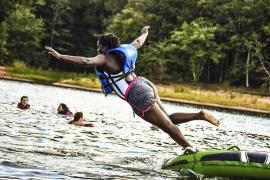The weather is changing, things are getting festive, and I can’t believe that my favorite time of year is already here. That’s right, I’m talking about staff hiring season.
Whether you’re just starting to think about hiring for next summer, or you’re already in the thick of it, your application is one of the first steps in the process and something you should think about now.
Here are some top tips for great staff applications:
DO make your application as simple as possible to complete. Want deep, paragraph-length answers on a candidate’s approach to being a camp counselor? Ask for those in an interview. Applicants will quickly abandon your application if it takes them longer than a good-sized Postmates order, which means you’ll be missing out on great candidates. Get the basic information about who, what, and why — then send a follow up and/or interview request to dig deeper.
DON’T ask for the same stuff twice. Most applicant tracking systems (ATS) will allow you to require both a resume and a candidate’s work history, school, and more in separate fields. If you’re looking at a resume, though, that likely already includes whatever school and employment history the candidate thinks is relevant. Respect their time and keep them from duplicating their work.
DO use your application as a quick check for values alignment and culture fit. I’ve seen many counselor applications that have a long list of checkboxes for activity skills and certifications, but are those really dealbreakers for you? What if you asked whether a candidate liked stepping outside of their comfort zone and showing resilience rather than if they have experience in crafts and canoeing?
DON’T ask about skills or experience that are a part of your staff training. If lifeguard training is a part of your orientation, your candidates do need to know how to swim but don't need to be asked about current lifeguard certifications. If driving isn’t a part of your counselors’ jobs, you don't need to ask about driving history or licensure. If you’re already teaching new staff how to do something, they don’t need to have previous experience in that thing; asking for previous experience might prompt a great candidate to eliminate themselves from consideration.
DO respond to every application. You probably reply to every potential camp parent that reaches out to you, whether or not they register their child or eventually attend camp. Applicants are part of your camp community, too. Even if it’s just to say “Thank you for your interest in joining our team,” a little communication goes a long way, and as you know from being on the hiring side, there’s nothing worse than getting ghosted. An unqualified candidate in 2025 might turn up again a year or three later with just the skills you need. If nothing else, today’s potential camp counselors are tomorrow’s potential camp parents!
DON’T do anything illegal/discriminatory/dumb. I’ve seen applications, even in 2024, that ask for age (age discrimination is illegal for candidates 40 or older) or photos (which can be used to determine someone’s gender/race/ethnicity). In many jurisdictions, asking about criminal history on an application is now prohibited, but lots of camps don’t update their applications frequently enough to account for changes like that. Be sure to have your attorney or HR professional review your application annually to make sure it’s compliant!
DO think of your application as the first step in a longer process. If you keep your application short and relevant, it’s not going to give you enough information to decide whether or not to hire someone. Thankfully, that’s not the point of a job application. You’ll make a hiring decision based on an accumulation of evidence from an application, interviews, references, and more. Use your application to decide whether you’d like to learn more about a candidate, and you’ll have a wider pool to choose from.
And when you decide to learn more about a candidate? That’s where a great interview process comes in…
DO use your interview as a learning opportunity for the candidate as much as for you. Think of the interview as a way for them to learn more about you and your camp, and about doing interviews in general. If your camp is like mine, this is the very first interview that many of our applicants are doing in their professional lives. That means that they may not know how to conduct themselves in an interview or how to answer the kinds of questions you’re asking. Many camps are sharing an “interview preview guide” when they invite candidates into that process, which helps them prepare; this might even include some of the actual questions you’re going to ask. It shouldn’t be a pop quiz! Great interviews help you assess whether someone could be a good camp counselor, not whether they’re good at answering interview questions.
DON’T ask about things that aren’t relevant to the job. Questions like “if you were a kitchen tool, what would you be and why?” are theoretically fun, but they’re probably only relevant if you’re hiring for an improv troupe or a job at Williams-Sonoma. I know that questions like these seem like they can help get a sense of someone’s personality or how they think on their feet, but they can just as often cause some to freeze up with anxiety about what the “right” answer should be (at least for folks who haven’t taken an improv class). Most importantly, they don’t tell us how someone would do the actual work of engaging with a group of campers. Asking behavioral questions about skills relevant to camp is a much better way to figure this out.
DO be your best you in every interview. The interview is your chance to get a first impression of each candidate as a potential employee, and it’s also a chance for them to get their first impression of you as a potential boss. For you, the interview at 4:45 on a Thursday might be your fifth interview and eighth Zoom of the day. For your interviewee, though, it could be the shining moment of their month. I’ve definitely caught myself losing focus as I ask the same questions for the 200th time in a season, and I’m mindful of needing to take a breath and a fresh look at each candidate. Close your browser tabs, put your phone on do not disturb, and give every candidate a fair shot at joining your team.
CONSIDER who your interviewers are. Counselor interviews can be a tedious, repetitive, time-consuming task, especially for a larger camp, and that makes it seem like a good task to delegate. If you believe that your staff is your camp’s most important resource, though, you may want to reconsider that. I’ve spoken to several camp owners in my independent camp community recently who (like I do) personally interview everyone who wants to work at their camp. We do this not only because (like above) it sets a great first impression, but also because we know that we can set clear expectations and check for alignment with our culture and values. This creates a shared accountability much better than interviews done by a recruiter or someone from the HR department who that new staff member will never see again. If we can follow someone, personally, from application to interview to hiring to orientation, we build a bond with them that strengthens our staff community.
By crafting a thoughtful application and interview process, you can attract and select candidates who align with your camp's culture, values, and goals. Remember, every interaction with a potential hire is an opportunity to set the tone for their journey with your camp — and to build the foundation for a strong, cohesive team.
This blog was written on behalf of ACA's Project Real Job, whose goal is to support camps in their efforts to recruit, hire, and retain staff.
Photo courtesy of MedCamps of Louisiana in West Monroe, LA.
Andy Kimmelman is the owner and director of Tumbleweed Day Camp in Los Angeles and co-founder of Dear Scout, the only camp-specific employee assistance program. He’s also an SHRM Senior Certified Professional and (most importantly) a cool dad. You can contact Andy about all things camp staff at [email protected]
The views and opinions expressed by contributors are their own and do not necessarily reflect the views of the American Camp Association or ACA employees.




